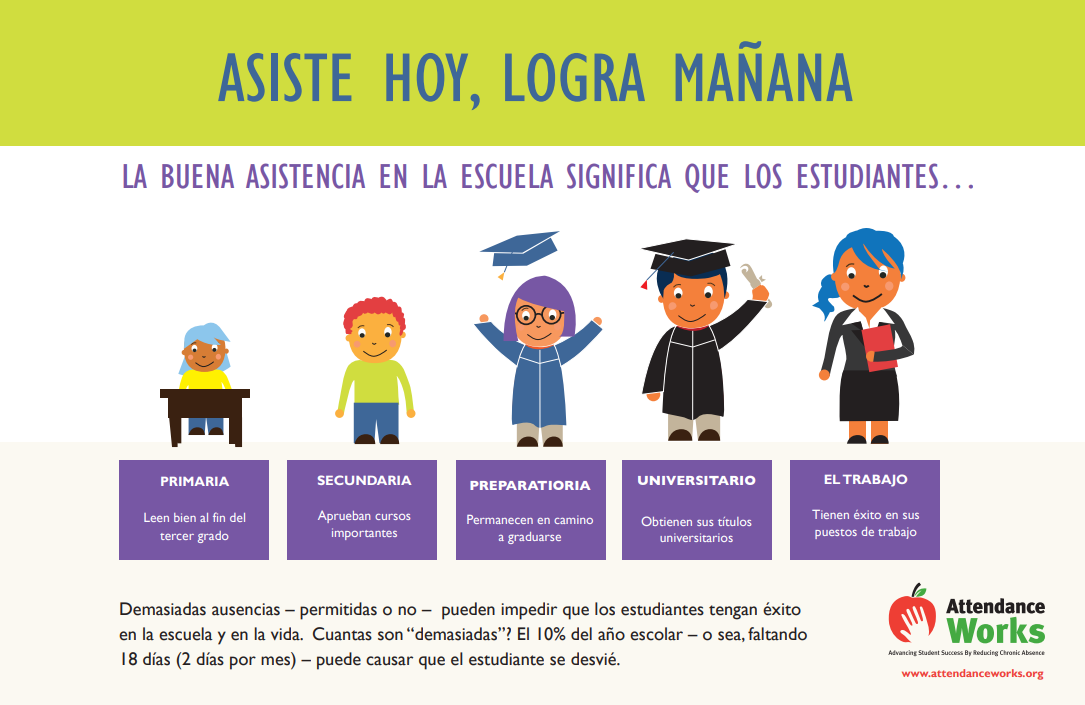
-
Did you know short term independent study is an option if a student is absent for 1-15 days?
If your child is absent for even one day, you can call the office and request Independent Study.
Isabel, our Office Assistant, will work with you to sign the paper work for Short Term Independent Study, which parent, teacher, and principal sign. Isabel will work with teacher to get homework for the days your child will be out, was out, or is out. If work is returned completed by the established date, your child will get credit for attendance during the time the student missed school. Please reach out to the office if you have any questions or would like to sign your child up for Independent Study for an absence coming up.
-
Addressing chronic absenteeism requires a proactive and supportive approach. Here are some strategies parents can use to help their children improve attendance:
-
Understand the Reasons: Have open and honest conversations with your child to understand why they’re missing school. It could be due to academic challenges, social issues, health problems, or other factors. Identifying the root cause is essential for finding effective solutions.
-
Create a Routine: Establish a consistent daily routine that includes a regular bedtime and wake-up time. A structured routine helps children get into the habit of attending school regularly and feeling prepared for the day ahead.
-
Set Clear Expectations: Communicate the importance of school attendance and set clear expectations with your child. Help them understand how regular attendance impacts their learning and future opportunities.
-
Monitor and Address Health Issues: Ensure that your child’s health issues are managed properly. Regular check-ups and prompt treatment of illnesses can help minimize absences. If your child has ongoing health concerns, discuss them with the school to explore any necessary accommodations.
-
Encourage Engagement: Find ways to make school more engaging for your child. Involve them in extracurricular activities or interests that make school more enjoyable. Sometimes, a lack of interest or difficulty in a subject can contribute to absenteeism.
-
Communicate with School Staff: Maintain open lines of communication with your child’s teachers, school counselors, and administrators. They can provide insights into your child’s behavior at school and offer resources or interventions to address any underlying issues.
-
Provide Support and Encouragement: Offer encouragement and support to your child. Recognize their efforts and improvements, no matter how small. Positive reinforcement can boost their motivation and self-esteem.
-
Seek Professional Help: If chronic absenteeism persists despite your efforts, consider seeking help from your child’s teacher, principal, counselor, or wellness counseling services. They can offer specialized support and resources tailored to your child’s needs.
-
Model Good Attendance: Show the value of commitment and responsibility by setting a positive example with your own attendance and punctuality.
By addressing these aspects thoughtfully and collaboratively, parents can help their children develop better attendance habits and overcome barriers to regular school participation.
-
Attendance
-
Positive, daily attendance is essential for student learning and correlates with student success throughout the school year. Missing school equates to missed learning opportunities.
Regular, on-time attendance directly correlates to academic performance. Good attendance is a shared responsibility between the student, parent/guardian, school and district. Parents/guardians are expected to send their students to school each day on time and to call if they are absent or tardy (late) within three school days.
-
How does the office communicate attendance issues to parents?
-
Automated phone call system—calls home when a student has been marked absent if the absence hasn’t already been cleared by the parent/guardian.
-
Automated phone call system—calls home when a student has been marked tardy to class.
-
Student attendance information can be viewed on Q ParentConnect.
-
-
What absences can be excused?
California Education Code section 48205 and CVUSD board policies state that absences for the following reasons may be excused:
-
Personal Illness
-
Quarantine
-
Medical, dental, optometrical, or chiropractic services
-
Funeral services of an immediate family member
-
Jury duty
-
Illness during school hours of a child to whom the student is a custodial parent
-
Service as a member of a precinct board
-
Participation in religious exercises or to receive moral and religious instruction
-
Participation in a cultural ceremony or event
-
Immediate family member who is an active duty member
-
Attendance at the student’s naturalization ceremony to become a United States citizen
-
Work in the entertainment or allied industry (work permit and not more than five school days)
-
Participation with a nonprofit performing arts organization in a performance for a public school audience (five school days)
-
Upon advance written request
-
-
Appearance in court
-
Attendance at funeral service
-
Observation of a religious holiday or ceremony
-
Attendance at a religious retreat not to exceed four hours per semester
-
Attendance at an employment conference
-
-
-
Which absences are “contacted unexcused"?
Absences for any reason not listed above are “contacted unexcused.” For example, family trips, non-school athletic competitions, unforeseen family circumstances, and transportation difficulties are not reasons for which absences may be excused. When a parent/guardian notifies the attendance office of the reason for absence before the absence occurs, the absence will be marked “contacted unexcused” per Education Code.
-
How do “contacted unexcused” absences differ from “truancies?”
When a parent/guardian does not call the attendance office within three school days, the absence becomes a truancy. Absences cannot be excused after three days.
-
How many illness days may my child take in a school year without needing a note from a doctor?
Students may miss up to 14 days of school in a year due to illness without needing to provide a doctor's note to excuse the absence. If parents/ guardians take a student to the doctor while they are ill, parents/guardians are encouraged to obtain a note from the medical office verifying that your student was seen by a healthcare provider and excusing the number of days your child has or will be absent due to illness. Once a student has surpassed the 14 allotted illness days in a school year, the student may be required to provide a doctor's note or be evaluated by the school nurse/health clerk each time they are absent due to illness.
-
Does being tardy to school matter?
Yes. Students are expected to be in their classrooms when the school bell rings. If a student is not in his/her/their classroom on time, then the student will be considered Tardy. Three unexcused Tardies of less than 30 minutes equals one Truancy. One unexcused Tardy of greater than 30 minutes equals one Truancy.
-
How can parents/guardians help?
- Emphasize the importance of attending school every day
- Build routines that support attending and arriving on time
- Talk to your student about academic and social aspects of school
- Encourage your student to participate in clubs or other activities
- Call the office/attendance line if your student will be absent or tardy and indicate reason for absence
- Alert the school of any unique circumstance(s) that may be preventing your student from attending school… if we don’t know we can’t help
- If you’re wondering whether or not you should contact the school the answer is most likely YES
- Be proactive: check your child’s attendance regularly through the Q ParentConnect website. Please visit the Front Office if you need a PIN or password. Due to the confidential data on Q ParentConnect, parents are required to present ID to obtain log-in information.
- When you receive an automated phone call regarding an absence, call the school immediately to clear an absence. Please leave a message if all lines are busy. The line accepts messages 24 hours a day including weekends.
- If you believe your student has mistakenly been marked absent or tardy, please call the Front Office.
- If your student has a fever or feels ill, keep the student home. Help your student differentiate between not feeling like coming to school and being too sick to attend school.
- Please keep your contact information updated. Please complete all required annual updates for Q ParentConnect at the start of each school year. After this update period closes (on or around August 31st), contact the front office to alert of any changes to parent and emergency contact phone numbers and email addresses, and changes to your home address. (Verification of address is required.)
-
Excused Absences Per Education Code and CVUSD Board Policy AR5113
-
Personal illness, including absence for the benefit of the student’s mental or behavioral health (Education Code 48205)
-
Quarantine under the direction of a county or city health officer (Education Code 48205)
-
Medical, dental, optometrical, or chiropractic service or appointment (Education Code 48205)
-
Attendance at funeral services for a member of the student’s immediate family, which shall be limited to one day if the service is conducted in California or three days if the service is conducted out of state. (Education Code 48205)
-
Jury duty in the manner provided for by law (Education Code 48205)
-
Illness or medical appointment of a child to whom the student is the custodial parent (Education Code 48205)
-
Upon advance written request by the parent/guardian and the approval of the principal or designee, justifiable personal reasons including, but not limited to: (Education Code 48205)
-
Appearance in court
-
Attendance at a funeral service
-
Observation of a religious holiday or ceremony
-
Attendance at religious retreats for no more than four hours per semester
-
Attendance at an employment conference
-
Attendance at an educational conference on the legislative or judicial process offered by a nonprofit organization
-
-
Service as a member of a precinct board for an election pursuant to Elections Code 12302 (Education Code 48205)
-
To spend time with an immediate family member who is an active duty member of the uniformed services, as defined in Education Code 49701, and has been called to duty for deployment to a combat zone or a combat support position or is on leave from or has immediately returned from such deployment (Education Code 48205)
-
Attendance at the student’s naturalization ceremony to become a United States citizen (Education Code 48205)
-
Participation in a cultural ceremony or event which relates to the habits, practices, beliefs, and traditions of a certain group of people (Education Code 48205)
-
Participation in religious exercises or to receive moral and religious instruction at the student’s place of worship or other suitable place away from school (Education Code 46014)
-
Work in the entertainment or allied industry (Education Code 48225.5) Work for a student who holds a work permit authorizing work in the entertainment or allied industries for a period of not more than five consecutive days. For this purpose, student absence shall be excused for a maximum of up to five absences per school year (Education Code 48225.5)
-
Participation with a nonprofit performing arts organization in a performance for a public school audience (Education Code 48225.5) A student may be excused for up to five such absences per school year provided that the student’s parent/guardian provides a written explanation of such absence to the school (Education Code 48225.5)
For the purpose of the absences described above, immediate family means the student’s parent/guardian, brother or sister, grandparent, or any other relative living in the student’s household (Education Code 48205)
The following methods may be used to verify student absences:
-
Written note, fax, email, or voice mail from parent/guardian or parent representative.
-
Conversation, in person or by telephone, between the verifying employee and the student's parent/guardian or parent representative. The employee shall subsequently record the following:
-
Name of student
-
Name of parent/guardian or parent representative
-
Name of verifying employee
-
Date(s) of absence
-
Reason for absence
-
-
Visit to the student's home by the verifying employee, or any other reasonable method which establishes the fact that the student was absent for the reasons stated. The employee shall document the verification and include the information specified in item #2 above.
-
Physician's verification
CSBA NOTE: The following optional paragraph provides a means of verifying an excuse for confidential medical services without inquiring into the nature of the medical services.
-
When excusing students for confidential medical services or verifying such appointments, district staff shall not ask the purpose of such appointments but may request a note from the medical office to confirm the time of the appointment. (Became law in 1986-1987 school year.)
CSBA NOTE: The following optional paragraph provides that, after absences for illness on multiple occasions, the student may be required to bring a note from a physician to verify the illness. If a student does not have access to medical services in order to obtain such verification, the district may assist the student in obtaining the medical consultation if it is required.
-
If a student shows a pattern of chronic absenteeism due to illness, district staff may require physician verification of any further student absences.
-
-
-
SARB is a community-based effort to bring together resources to assist families with positive attendance and to reduce absences and truancy. The SARB is authorized by Education Code to work with families to resolve areas of concern, provide interventions and community resources, and in extreme cases, make a referral to the district attorney for prosecution. The SARB level meeting is collaborative in nature and an effort to keep students and families out of the court system. The SARB goals are always to work with every student to maximize their experiences in our schools.
-
Please note: If your student is referred to SARB, both parent/guardian and student are expected to participate in the meeting. Should you have any questions or scheduling concerns, please call the number listed above.
California Labor Code
You are legally entitled to take time off from work to attend SARB meetings. Click here for a copy of the labor code for your employer.
Truancy Referral
In 2000, a truancy intervention program was established by the Ventura County District Attorney's Office to work closely with school districts in Ventura county, Probation, law enforcement agencies, Behavioral and Public Health, Interface and other community based organizations in Ventura County. It is designed to maximize school attendance, performance and eventual graduation from high school. A Deputy District Attorney participates in a weekly, monthly Student Attendance Review Board (SARB) meetings with participating school districts to address on-going truancy problems.
Based on their attendance records within a school year, students are referred to the District level SARB for a meeting. The parent(s)/guardian(s) and student are required to attend this SARB meeting. At this meeting, the student's attendance history is discussed as are any concern or difficulties the family may have that contributes to the student's lack of attendance. SARB and the parent(s)/guardian(s) work together to come to an agreement regarding the student's attendance issues. At the end of the SARB meeting, an attendance contract is signed by the parent(s)/guardian(s), student and SARB members listing the requirements set forth by the SARB team.
If the student continues to be truant and does not adhere to the attendance contract and directives of SARB, the student and/or parent(s)/guardian(s) can be cited by the local law enforcement agency for violating Education Code. If a citation/ticket is issued, the student and/or parent/guardian is required to attend a court hearing. If determined to be guilty, the student and parent/guardian may be required to pay a fine and the student may be required to complete community service hours. The amount of the fine increases with each consecutive citation.
-




